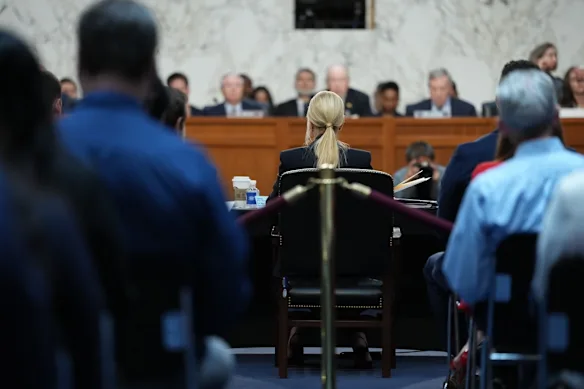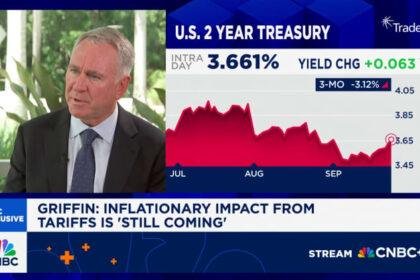Tensions Rise as Senate Hearing Exposes Partisan Divide in Justice Department Oversight
In a heated Senate hearing, Democratic Senator Mazie Hirono of Hawaii accused the Department of Justice (DOJ) under Attorney General Pam Bondi of transforming into a “Department of Revenge and Corruption.” This assertion reflects growing concerns among Democrats regarding the politicization of the DOJ, particularly in light of ongoing investigations into former President Donald Trump and his associates.
A Divided Hearing
The hearing, which lasted over four hours, showcased a stark partisan divide. Democrats pressed Bondi on various politically charged investigations, including the dismissal of career prosecutors and the implications of the DOJ’s actions on public trust. Hirono’s remarks encapsulated the sentiment among many Democrats, who believe that the DOJ is being weaponized to serve the interests of the current administration and its allies.
Bondi, however, consistently deflected questions regarding these investigations, instead echoing conservative narratives that the Biden administration’s DOJ has itself been politicized. “They were playing politics with law enforcement powers and will go down as a historic betrayal of public trust,” Bondi stated, referring to the Biden DOJ’s actions against Trump. This back-and-forth highlights the ongoing struggle for control over the narrative surrounding the DOJ’s integrity.
Historical Context of DOJ’s Role
The DOJ has long been a focal point in American politics, often caught in the crossfire of partisan battles. Historically, the department has faced accusations of bias from both sides of the political spectrum. The Watergate scandal in the 1970s, for instance, raised questions about the integrity of the DOJ under President Richard Nixon. Similarly, the investigations into the Trump administration have reignited debates about the department’s independence and its role in safeguarding democracy.
The current hearing echoes these historical tensions, as both parties vie for control over the narrative surrounding the DOJ’s actions. The implications of these investigations extend beyond individual cases; they touch on the very foundation of public trust in law enforcement and the rule of law.
Bondi’s Defense and the Republican Response
Throughout the hearing, Bondi maintained that her department is committed to restoring a “one-tier system of justice for all.” She reiterated her pledge from her confirmation hearing to avoid politicization within the DOJ. However, Democrats, including Senator Amy Klobuchar, challenged her on whether she has upheld that commitment, to which Bondi confidently responded, “I believe I absolutely have.”
Republicans, on the other hand, rallied around Bondi, framing the investigations into Trump as evidence of a deeply politicized DOJ. They pointed to recent revelations that the FBI had analyzed phone records of several Republican lawmakers as part of an investigation into Trump’s efforts to overturn the 2020 election results. Senator Chuck Grassley, the Republican chairman of the committee, expressed outrage over what he termed an “unconstitutional breach” of privacy.
This partisan defense of Bondi underscores the broader strategy employed by Republicans to discredit the Biden administration’s DOJ. By framing the investigations as politically motivated, they aim to galvanize their base and shift public perception.
The Broader Implications of Investigations
The DOJ’s current investigations extend beyond Trump, targeting vocal critics of the administration, including figures like Representative Adam Schiff and New York Attorney General Letitia James. These investigations have been met with vehement denials of wrongdoing from those involved, who argue that they are politically motivated.
The indictment of former FBI Director James Comey, charged with lying to the Senate Judiciary Committee, adds another layer of complexity to the situation. Comey’s case, which emerged shortly after Trump publicly urged Bondi to take action against him, raises questions about the motivations behind these investigations. Critics argue that the timing suggests a coordinated effort to silence dissenting voices.
The Future of the DOJ
As the hearing concluded, the future of the DOJ remains uncertain. The ongoing investigations and the partisan divide threaten to undermine public trust in the institution. The DOJ’s ability to operate independently and fairly is crucial for maintaining the rule of law in a democratic society.
The historical context of the DOJ’s role in American politics serves as a reminder of the delicate balance between law enforcement and political influence. As both parties continue to clash over the department’s actions, the implications for American democracy are profound.
Conclusion
The Senate hearing featuring Pam Bondi has illuminated the deepening rift between Democrats and Republicans regarding the DOJ’s role in contemporary politics. As accusations of politicization and weaponization of the department continue to surface, the integrity of the DOJ hangs in the balance. The outcome of ongoing investigations and the public’s perception of the department will play a critical role in shaping the future of law enforcement in the United States. The stakes are high, and the implications extend far beyond individual cases, touching on the very essence of democracy and public trust.











